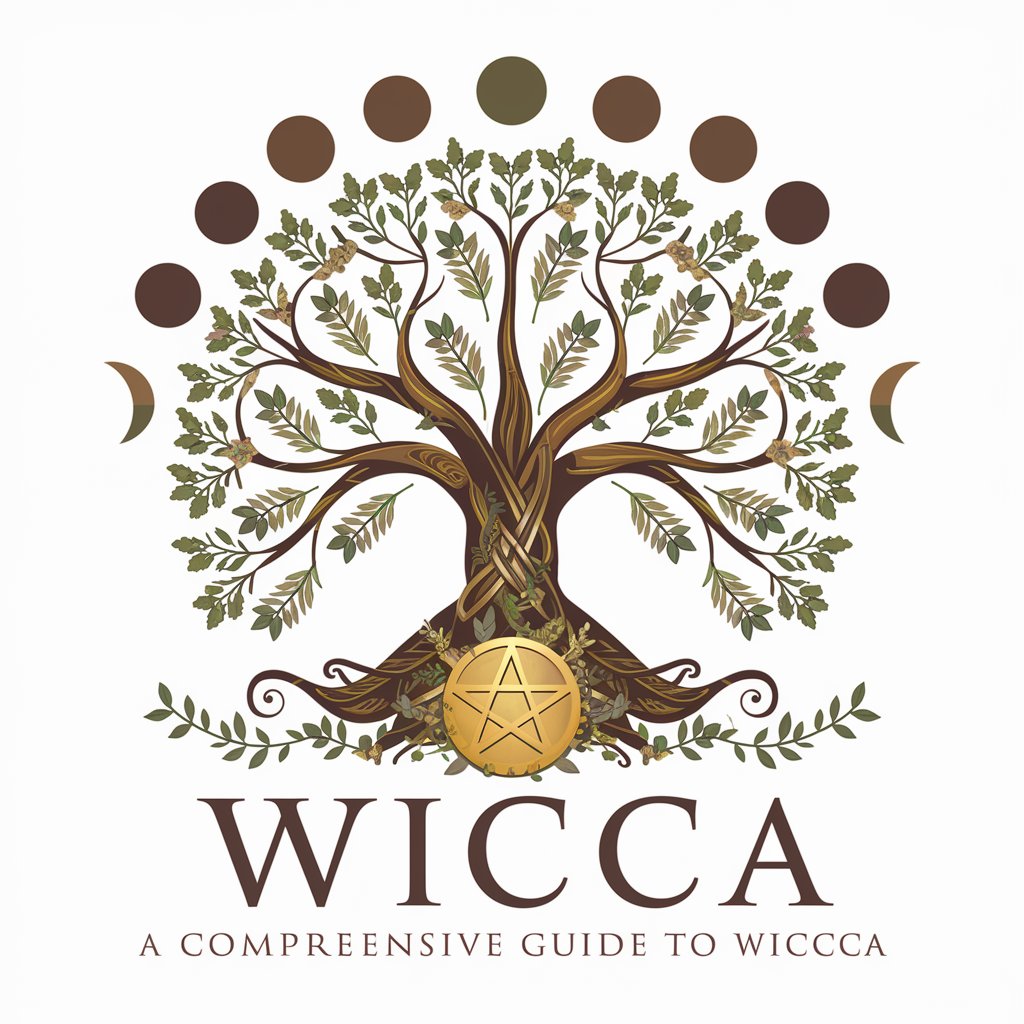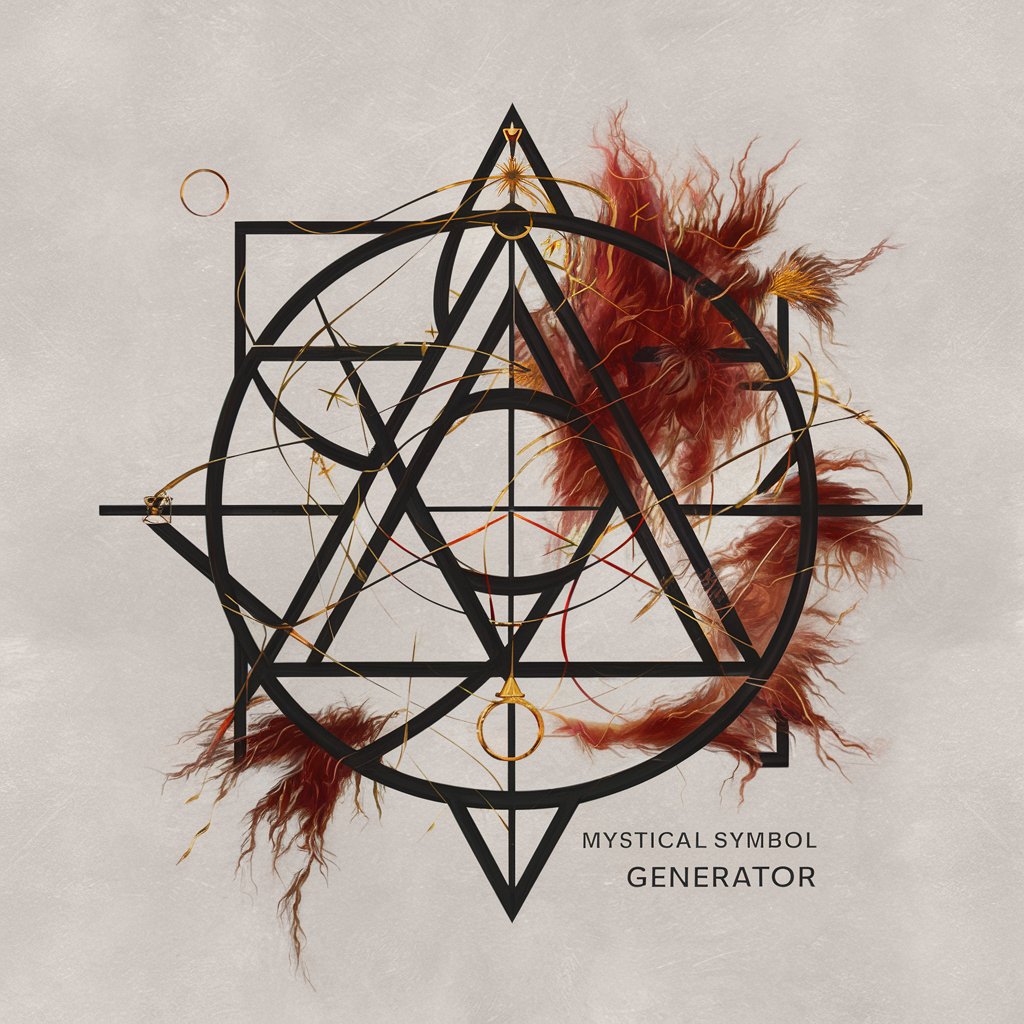Wicca - Wiccan Learning Path

Welcome to your Wiccan journey. Let's explore the mysteries together.
Empowering Your Spiritual Journey with AI
Explore the historical roots of Wicca, focusing on its evolution from ancient pagan traditions.
Delve into the symbolic meanings of common Wiccan tools and how they are used in rituals.
Discover the various types of Wiccan spells and their practical applications in daily life.
Learn about the significance of the Wiccan Wheel of the Year and its festivals.
Get Embed Code
Introduction to Wicca
Wicca is a modern pagan, witchcraft religion that has gained popularity across the globe. It was introduced to the public in the 1950s by Gerald Gardner, a retired British civil servant and amateur anthropologist. Wicca draws upon a diverse set of ancient pagan and 20th-century hermetic motifs for its theological structure and ritual practices. It is a highly decentralized religion, with practices varying widely among practitioners, often referred to as Wiccans. Common elements include the worship of the Goddess and the God, the observance of seasonal festivals within the Wheel of the Year, and the use of magic. An example of Wicca in practice is the celebration of Samhain, a festival marking the end of the harvest season and the beginning of winter or the 'darker half' of the year, which is considered a time when the veil between this world and the spirit world is at its thinnest. Powered by ChatGPT-4o。

Main Functions of Wicca
Ritual Practice
Example
Casting a circle to create sacred space for rituals.
Scenario
Wiccans often begin their ceremonies by casting a circle to create a sacred space. This involves physically delineating a circle on the ground and then spiritually purifying it. This practice is foundational for conducting rituals, celebrations, or magic work within a space that is believed to be protected from external energies.
Seasonal Celebrations
Example
Observing the Sabbats, such as Beltane or Yule.
Scenario
Wiccans celebrate eight major holidays throughout the year, known as Sabbats, which make up the Wheel of the Year. These celebrations are tied to the Earth's seasons and cycles. For instance, Beltane is celebrated on May 1st, marking the beginning of summer, with traditions including the lighting of fires and maypole dancing, to symbolize fertility and protection.
Magic and Spellwork
Example
Conducting spells for healing, protection, or personal growth.
Scenario
Wicca incorporates the use of magic and spellwork, often with the intention of bringing about positive change. This can range from simple spells using candles, herbs, and crystals, to more complex rituals invoking deities for assistance. An example is a protection spell, where a practitioner might cast a circle, call upon protective spirits or deities, and use specific herbs and symbols to create an amulet or charm.
Ideal Users of Wicca Services
Spiritual Seekers
Individuals exploring spiritual paths outside of mainstream religions who are drawn to nature-based faiths. They benefit from Wicca's flexible, eclectic approach, allowing them to incorporate personal beliefs and practices.
Practitioners of Magick
Those interested in the practical applications of magic and spellwork as part of their spiritual practice. Wicca offers a structured yet adaptable framework for engaging with magical practices safely and ethically.
Environmental and Nature Activists
People who feel a deep connection to the Earth and its cycles. They find solace and spiritual fulfillment in Wicca's emphasis on the divine in nature and its celebrations that are closely tied to the Earth's seasons.

How to Practice Wicca: A Beginner's Guide
Initiate Learning
Begin your Wiccan journey with thorough research and learning. Study foundational texts, understand the history, beliefs, ethics, and the different traditions within Wicca.
Connect with Nature
Wicca deeply values the natural world. Spend time outdoors, learn about the cycles of the Earth, the moon phases, and how they correlate with Wiccan rituals and practices.
Create Your Space
Set up an altar or sacred space in your home. This space should reflect your personal beliefs, the elements, and the deities you feel drawn to.
Practice Rituals
Begin practicing simple rituals and spells. Start with grounding and centering exercises, casting a circle, and celebrating Sabbats and Esbats according to the Wheel of the Year.
Join a Community
Consider joining a coven or Wiccan community. Learning from others can provide support, deeper insights, and shared experiences.
Try other advanced and practical GPTs
PokeOasis Helper
Elevate your Pokemon MMO with AI-powered insights.

Stock Picks in AI Industry
Empowering AI-focused investments with cutting-edge analytics.

WordCraft Wizard
Crafting Words, Empowering Ideas

FREE AI Email Finder - Find email from any website
Unlock Email Contacts Instantly with AI

Geppetto's Dad
Empower your creativity and productivity with AI.

BibSonomy Research Assistant
Elevate Your Research with AI-Powered Insights

Professor's Pen
Craft Messages with AI Precision

Oregon Lawyer
Empowering Legal Decisions with AI

TRON
Streamlining your cloud deployments.

Mystical Symbol Generator
Craft Your Mystique with AI

개발자 Assistant
AI-Powered Development Guidance

자기소개서 자동 작성 - 조박사 😎
Craft Your Story with AI

Frequently Asked Questions about Wicca
What is Wicca?
Wicca is a modern pagan, witchcraft religion. It was popularized in the 1950s and 1960s by Gerald Gardner. It involves practices and beliefs centered around magic, nature worship, and the reverence of a God and Goddess.
How do Wiccans practice their faith?
Wiccans practice through rituals, celebrating the Wheel of the Year, casting spells, and honoring the divine in nature. Practices vary widely among individuals and traditions.
Can anyone become a Wiccan?
Yes, anyone interested in following the path of Wicca can begin their journey with study, practice, and a genuine connection to the Wiccan beliefs and principles.
Do Wiccans worship Satan?
No, Wiccans do not worship Satan. Wicca does not involve the worship of Christian or Abrahamic concepts of evil. It is a nature-based religion that focuses on the duality and balance of the divine.
What is the Rule of Three?
The Rule of Three is a Wiccan ethical principle stating that whatever energy a person puts out into the world, be it positive or negative, will be returned to that person threefold.
